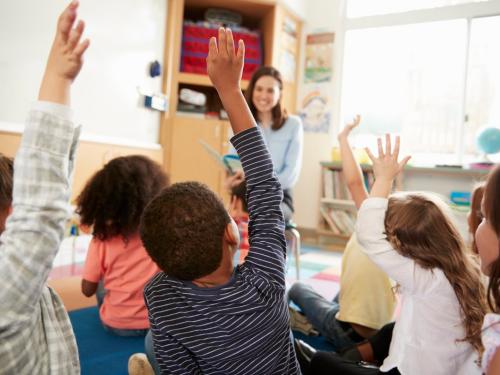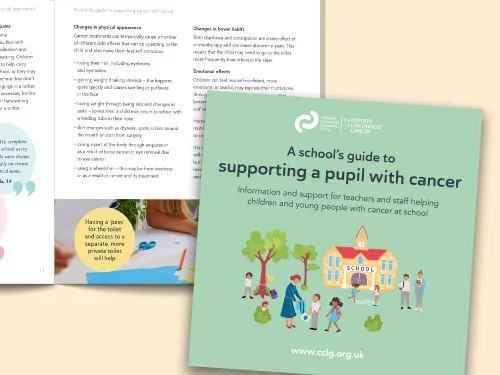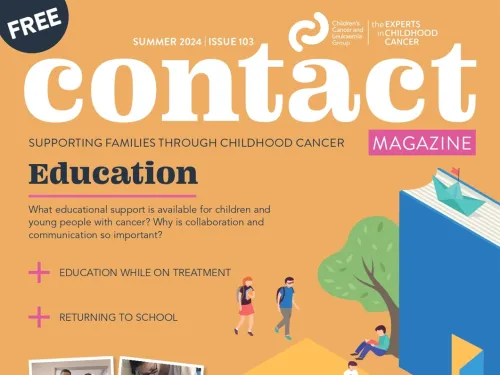Children undergoing treatment for cancer often miss lots of time from school after diagnosis. This can be due to going into hospital, the side effects of treatment, or generally not feeling well enough to fully take part in daily school life. Long absences can have big implications on educational progress, as well as relationships with friends.
Most children’s cancer hospitals have education departments that can support the child while they are staying in hospital. Their main purpose is to help keep children’s minds active while in hospital and to help them keep up with their school work as much as possible. It’s even possible for children to take exams in hospital if necessary. Teaching staff at the hospital will liaise with your child's school so that work for the pupil can be in line with their peers. Communication between your child's teacher and the hospital school is essential.
Home tuition can be helpful for a short time if a child feels too ill to attend school, for example, after a stem cell transplant when they may be immunosuppressed for a period of time. It can help your child catch up on missed work and prepare them for their return to school. Your child's hospital team and the hospital school can arrange this. Schools should be able to refer to their local authority service to liaise with the home tutor about appropriate work for your child. Sometimes home tuition can run alongside part-time attendance in school.
Keeping teachers informed
It’s important to let the school know how your child is doing. As soon as possible after your child is diagnosed, contact the head teacher to tell them what’s happening. It can help to let the school know about the plans for treatment. The school teachers can then work with the hospital education department to make sure they cover the same work as the rest of the class.
It may be helpful to think about yours and your child’s wishes about sharing their information. At any stage of treatment, your child should be involved in letting the teacher know what information they would like to be shared with their classmates.
The process of returning to school can be made easier through planning and preparation. Your child’s keyworker (usually a clinical nurse specialist or hospital social worker) will be able to help you to communicate with your child’s school. They will help to coordinate an individual health care plan with you to ensure that school are aware of your child's diagnosis, treatment plan, potential side effects and how the school can help.
Risk of infection at school
As chemotherapy lowers the immune system, children undergoing treatment have a higher risk of picking up infections. The risk of infection should not stop children going to school. Children whose blood levels are in a safe enough range will be advised to return to school and enjoy their usual activities. However, many parents will worry about the risk of infection which may result in them keeping their child at home.
As chemotherapy suppresses the immune system, chicken pox and measles are especially dangerous to children being treated for cancer. Your child’s school needs to be vigilant and inform you immediately if an outbreak occurs. It is advised that schools send a letter to parents of all children at the school, informing them of the importance of alerting the school if their child has chicken pox or measles.
If your child has been exposed to chickenpox and has not had it before, contact the hospital straight away. It may be necessary to give your child some medicine to prevent chicken pox developing.
It can be difficult to get the balance right between letting your child mix with their friends and worrying that they might pick up an infection. You can discuss this with both the hospital staff and the teachers at school to make sure you’re happy with what your child does.
Worries about returning to school
Going to school can be a relief for many children as a refuge from the world of hospitals and procedures – a place for fun, friends and learning. Most children are keen to get back to the familiar routine of school as soon as possible and re-adjust to some normality. However, some children, especially teenagers, may dread going back to school. They may worry for the following reasons:
- they look physically different and feel self-conscious
- they worry that they have fallen behind with school work
- they have physical limitations that may restrict them from taking an active part in sports or activities
- they have difficulty moving around e.g. need a wheelchair or have balance issues
- they feel scared and anxious about their illness and the future
- they worry that they will not 'fit' back in with their friends or friendships will have been affected
- they may have a fear of being bullied by other children at school.
Teenagers may also be trying to cope with normal signs of adolescence such as hormones and mood swings. Having cancer can be lonely and traumatic, and there can be a dawning realisation that their cancer experience has changed them.
Keeping up with schoolwork
It’s important for your child to try to keep up with schoolwork whenever they can. Learning can continue outside school. By speaking regularly to the teacher, you’ll know which subjects are being covered. Often, the teacher will send assignments and materials home with siblings or arrangements can be made to collect them.
Your child should have an individual education plan in place. This plan can be shared between your child’s school and hospital school to ensure there is consistency in what is being taught.
To help your child keep up in school, you may need to ask for a special education statement. This qualifies your child for extra help. It may be beneficial to work with the school SENCo to plan and ensure the right support is put in place.
Educational support
If treatment has affected your child’s ability to learn, this can be a major frustration for them and may affect their confidence and self-esteem. The school can give extra help for children with learning difficulties. Talk to the teachers or the school SENCo if you think your child may have problems.
Sometimes a child may benefit from having an assessment for an education, health and care (EHC) plan. These are for children and young people aged up to 25 who need more support than is available through special educational needs. EHC plans identify educational, health and social needs and set out the additional support required to meet those needs.
An EHC plan is not needed by most children with a cancer diagnosis. The school, hospital or parents can request an assessment to be carried out by the local authority. For more information, please visit www.gov.uk/children-with-special-educational-needs
Very young children
Many children diagnosed with cancer are very young and have not yet started school. As a parent, you may have to choose between having your child at nursery throughout treatment or keeping your child at home.
Keeping your child at home may mean they have less chance for social growth and development, but if they stay at nursery you may feel there’s a risk of infection. There is no right or wrong decision – it’s a personal choice for you to make. You may want to think about whether:
- your child is already settled at nursery or pre-school
- your child’s social needs can be met by siblings and/or other children outside of the nursery
- your child is well enough to attend nursery or pre-school
- your child has already had chickenpox
If your child is already at nursery or pre-school it is important to communicate with the staff there as soon as you can. If you decide for your child to attend nursery or pre-school your keyworker (usually a clinical nurse specialist or hospital social worker) can help you to plan this with the setting. They will be able to advise any necessary arrangements or adjustments such as setting up a system for parents to inform them about a child who has chickenpox or measles.
Siblings
A cancer diagnosis can cause strong and often conflicting feelings in siblings of the child or young person. They will experience huge disruption to normal routines and family life and will feel a number of emotions. They may feel jealous and resentful of the attention given to the ill child, guilty that they are somehow responsible for the illness or that they are not doing enough to help.
Many siblings keep their feelings bottled up to avoid worrying their parents. Often, the place where siblings show how they feel is at school. It is a good idea to speak to the sibling's teachers so that they are aware of the situation and can support the child with any issues that may arise with sensitivity.
’A school’s guide to supporting a pupil with cancer’ has been written by clinical experts together with teachers which covers all of the main issues and concerns of returning to school with some helpful tips and advice.
It can be difficult to get the balance right between letting your child mix with their friends and worrying that they might pick up an infection. Most infections that children on cancer treatment pick up are not from other people or children but from their own body. For most children on cancer treatment returning to school is recommended, even when their immune system is low. It is important that they carry on with as normal a routine as possible. Keeping your child at home may mean they have less chance for social growth and development. At your child’s treatment centre, a nurse specialist or social worker will be able to discuss the risks and benefits of attending school further with you. They will also be able to arrange for a meeting to take place at your child’s school to discuss and make them aware of their diagnosis, treatment and the implications of this. They will be able to work with you, your child and their school to develop a plan of care that will address their medical and support needs in school, and provide advice about minimising the risk of infection.David Thomas Children's Oncology Macmillan Nurse Specialist, Leeds General Infirmary, UK CCLG member and member of CCLG's Publications Committee
Information in this section is based on our booklet 'A school's guide to supporting a pupil with cancer'. Reviewed by the CCLG Information Advisory Group comprising parents, survivors and multiprofessional experts in the field of children's and young people's cancer.
Reviewed: May 2023
Next review due: May 2026




